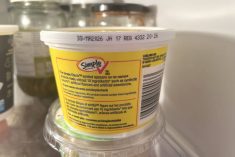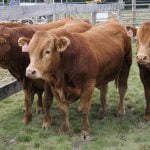Farm and food industry groups were quick to praise the launch of negotiations for a Canada-Japan free trade deal by Prime Minister Stephen Harper and his Japanese counterpart Yoshihiko Noda.
Japan is the third-largest economy in the world and is Canada’s second-largest agriculture market.
The market is worth almost $4 billion for Canadian farmers and food processors, a federal release says. Japan is the second-largest market for Canadian exporters with total pork and pork products worth almost $900 million in 2011. Canadian canola oil also holds 40 per cent of Japan’s edible oil market and is worth approximately $1.4 billion to Canada.
Read Also

Trade uncertainty is back on the Canadian national menu
Even if CUSMA-compliant goods remain exempt from Trump’s new tariffs for now, trade risk for farmers has not disappeared, Sylvain Charlebois warns.
Japan is Canada’s third-largest market for wheat with exports in 2011 totalling $471 million. Canada is Japan’s largest malt supplier and is responsible for 40 per cent of malt imports.
“Japan is a highly valued trading partner and this agreement will strengthen our economic partnership,” said Travis Toews, past president of the Canadian Cattlemen’s Association. He was part of a delegation accompanying the prime minister on an Asian trade mission.
If full tariff-free treatment for Canadian beef is secured, “the value of Canadian beef exports could reach more than $275 million annually and more importantly will increase the value of every animal we produce.”
Richard Phillips, executive director of Grain Growers of Canada, said a recent report approved by Canada and Japan shows there is potential for Canada to increase its GDP from between $3.8 billion to $9.0 billion through increased trade with Japan.
In 2010, Canada exported $3.3 billion in agri-food products to Japan accounting for 10 per cent of Canada’s total agri-food exports making Japan a high-priority market for Canada’s agriculture sectors, he added.
Japan has long been a priority market, says Kathleen Sullivan, executive director of the Canadian Agri-Food Trade Alliance. The group is “excited by the potential to expand trade relations with Japan.” She was also on the trade mission.
CAFTA members, including the beef, pork, canola, grain, malt, and sugar sectors, were responsible for almost $3.5 billion in agri-food shipments to Japan – 85 per cent of Canada’s total agri-food exports to that country.
“A free trade agreement with Japan could result in additional exports of high-value Canadian agri-food products to that country,” Sullivan noted. “Japan’s agriculture sector is highly subsidized and Japan currently applies high tariffs on many products and imposes non-tariff barriers in a number of areas. We encourage both governments to pursue an ambitious, wide-ranging agreement that expands trade in goods and addresses non-tariff measures — including technical trade barriers, sanitary and phytosanitary issues and customs administration — which affect agri-food trade.”
Japan is a destination of choice for all food-exporting nations, said Scott Entz, president of the Canadian Meat Council. Japanese self-sufficiency in food has decreased from 73 per cent in 1965 to 40 per cent today, the lowest among G8 countries.
Although relying on imports for 60 per cent of their food requirements, the majority of Japan’s 127 million consumers are unwilling to compromise on quality and are prepared to pay a premium for safe, high quality food products. The Japanese not only recognize Canadian food as being safe and of high quality, they associate Canadian-produced foods and beverages with positive images.
Of Canada’s $3.95 billion in agri-food and seafood exports to Japan in 2011, meat products alone accounted for $975.9 million or 25 per cent of the total, Entz said. That included $893.8 million of pork products, $65.9 million of beef and veal products and $16.2 million of horsemeat.
However, as Canada still accounts for only about 24 per cent of Japanese pork imports and three per cent of beef imports, Japan continues to present major untapped opportunities for Canada’s livestock farmers and meat processors.
In the last six years, Canada has concluded free trade agreements with Colombia, Honduras, Jordan, Panama, Peru and the European Free Trade Association states of Iceland, Norway, Switzerland and Liechtenstein. It is also in negotiation with many others, including India, the European Union and Japan.














